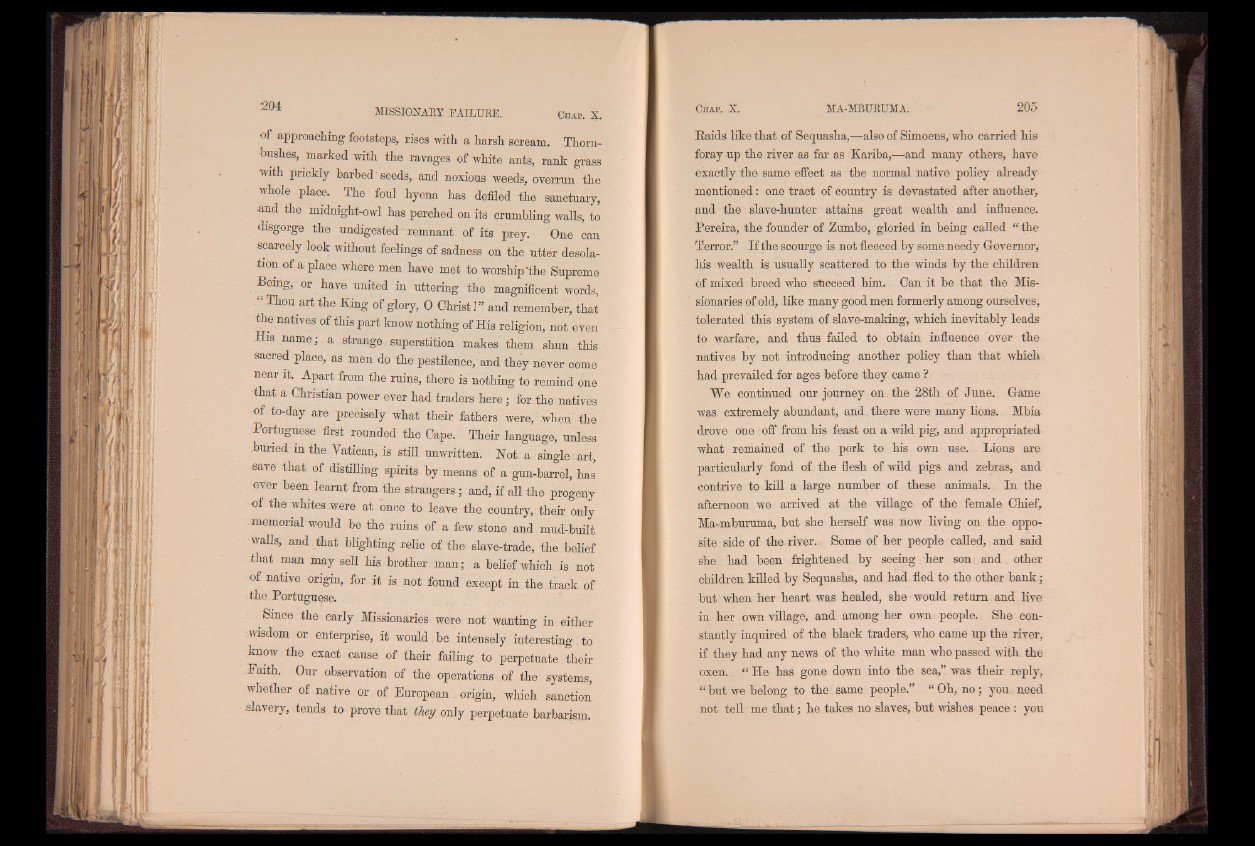
of approaching footsteps, rises with a harsh scream. Thorn-
bushes, marked with the ravages of white ants, rank grass
with prickly barbed seeds, and noxious weeds, overrun the
whole place. The foul hyena has defiled the sanctuary,
•and the midnight-owl has perched on its crumbling walls, to
disgorge the undigested' remnant of its prey. One can
scarcely look without feelings of sadness on the utter desolation
of a place where men have met to worship'the Supreme
Being, or have united in uttering the magnificent words,
“ Thou art the King of glory, 0 Christ! ” and remember, that
the natives of this part know nothing of His religion, not even
His name; a strange superstition makes them shun this
sacred place, as men do the pestilence, and they never come
near it. Apart from the ruins, there is nothing to remind one
that a Christian power ever had traders here; for the natives
of to-day are precisely what their fathers were, when the
Portuguese first rounded the Cape. Their language, unless
buried in the Vatican, is still unwritten. Hot a single art,
save that of distilling spirits by means of a gun-barrel, has
ever been learnt from the strangers; and, if all the progeny
of the whites were at once to leave the country, their only
memorial would be the ruins of a few stone and mud-built
walls, and that blighting relic of the slave-trade, the belief
that man may sell his brother man; a belief which is not
of native, origin, for it is not found except in the track of
the Portuguese.
Since the early Missionaries were not wanting in either
wisdom or enterprise, it would be intensely interesting to
know the exact cause of their failing to perpetuate their
Eaith. Our observation of the operations of the systems,
whether of native or of European origin, which sanction
slavery, tends to prove that they only perpetuate barbarism.
Baids like that of Sequasha,—also of Simoens, who carried his:
foray up the river as far as Kariba,—and many others, have
exactly the same effect as the normal native policy already
mentioned: one tract of country is devastated after another,
and the slave-hunter attains great wealth and influence.
Pereira, the founder of Zumbo, gloried in being called “ the
Terror.” If the scourge is not fleeced by some needy Governor,
his wealth is usually scattered to the winds by the children
of mixed breed who succeed him. Can it be that the Missionaries
of old, like many good men formerly among ourselves,
tolerated this system of slave-making, which inevitably leads
to warfare, and thus failed to obtain influence over the
natives by not introducing another policy than that which
had prevailed for ages before they came ?
We continued our journey on the 28th of June. Game
was extremely abundant, and there were many lions. Mbia
drove one off from his feast on a wild pig, and appropriated
what remained of the pork to his own use. Lions are
particularly fond of the flesh of wild pigs and zebras, and
contrive to kill a large number of these animals. In the
afternoon we arrived at the village of the female Chief,
Ma-mburuma, but she herself was now living on the opposite
side of the river. Some of her people called, and said
she had been frightened by seeing her son and other
children killed by Sequasha, and had fled to the other bank ;
but when her heart was healed, she would return and live
in her own village, and among her own people. She constantly
inquired of the black traders, who came up the river,
if they had any news of the white man who passed with the
oxen. “ He has gone down into the sea,” was their reply,
“ but we belong to the same people.” “ Oh, no; you need
not tell me that; he takes no slaves, but wishes peace: you